When the Minnesota Timberwolves acquired Julius Randle in a trade that sent Karl-Anthony Towns away last October, the move was widely seen as being primarily about saving money. Very few observers believed that the Timberwolves, who had just reached the conference finals, could potentially improve by swapping Towns for Randle.
In fact, the idea of Randle fitting in Minnesota was largely mocked. He wasn`t generally perceived as a player who contributed to winning, so continuing that narrative was easy. Critics claimed he would undermine Minnesota`s strong defense and slow down their offense by holding the ball. When Anthony Edwards suddenly increased his three-point attempts, they blamed Randle for poor spacing.
Randle experienced a difficult January and missed the entire month of February. Reports surfaced that Minnesota might try to trade him before the deadline. It seemed every past criticism aimed at Randle was hitting its mark with remarkable accuracy as Minnesota spent most of the season fluctuating around the play-in tournament boundary.
However, fast forward just a few months, and Minnesota is heading back to the conference finals, significantly propelled by Randle. He continued the best stretch of his playoff, and likely professional, career on Wednesday with 29 points on 13-of-18 shooting as the Wolves eliminated the Warriors in five games.
Let`s be clear: Randle has always been a capable player, albeit with imperfections. He led the Knicks to three playoff appearances after they had endured six consecutive seasons missing the postseason, including records of 17 and 29 wins in the two years before his arrival.
During his most productive three years in New York, Randle averaged over 23 points and 10 rebounds. He achieved this despite constantly facing double-teams and driving lanes that were often clogged by defenders who didn`t respect the shooting threat of players like Elfrid Payton, RJ Barrett, and Derrick Rose.
Ultimately, Randle was perhaps asked to do too much as the primary option in New York. But in Minnesota, after having time to adjust to a more supporting role, which suits him better, he has transformed into a dominant playoff performer. Through 10 playoff games, Randle is averaging 23.9 points while shooting better than 51% from the field.
Against the Warriors in their recent series, no one, not even Draymond Green, could contain Randle. He demonstrated a new level of composure combined with his physical power, repeatedly overwhelming defenders to gain favorable post position and scoring with ease.
He relentlessly attacked with his left hand, finishing effectively at the rim through contact and off the backboard. He got to his preferred pull-up spots and created separation. He punished defensive mismatches, maneuvering into close range or utilizing his signature fall-back jumpers. The Warriors had no viable counter, and this level of play wasn`t new; he had already showcased his impressive offensive repertoire against the Lakers in the first round.
And what about the perceived shooting problem? Randle hit four three-pointers on Wednesday and is shooting over 37% from deep this postseason. At one point in the second quarter on Wednesday, as Randle was already putting on a show against the Warriors, all Stephen Curry could do from the bench was shake his head in disbelief.
Again, Randle has always been a skilled scorer. What stands out currently is his efficiency and the fluidity of his scoring. When he does hold the ball, it`s for a strategic reason – he`s identifying and attacking the right mismatches while Minnesota`s offense spaces out around him. Crucially, he`s not just scoring from these opportunities; he`s also creating for others.
Randle has historically been an underrated passer, but his accelerated decision-making process in the playoffs has been particularly noticeable. Sometimes he quickly moves the ball the moment he receives it; other times, he absorbs a double-team and finds an open shooter or patiently waits for a teammate to cut into space.
Across Games 2 and 3 against the Warriors, Randle accumulated 23 assists to complement his 48 points. He then followed that up with an even better scoring output, totaling 60 points across Games 4 and 5.
This is the kind of performance associated with superstars. However, what makes Randle so dangerous is that he doesn`t actually need to be the primary superstar; Anthony Edwards fulfills that role. With Randle playing like this, the Wolves are firing on all cylinders as they await the winner of the OKC-Denver series for a chance at the franchise`s first-ever NBA Finals appearance.
This success wouldn`t be possible without Randle. He has faced significant criticism over the years, some of it arguably warranted, perhaps because he was never quite good enough to be the top player the Knicks needed him to be, especially in the playoffs, even if he was the one who led them there. Now, he`s in the perfect situation on the right team to make a major impact in the playoffs, and he is seizing the opportunity, extending the list of critics who owe him an apology every single day.

